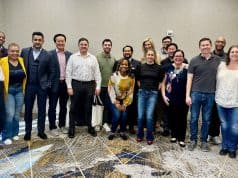
In her latest research, Eve Rosenzweig, associate professor of information systems and operations management, examines the role of national culture in delivering excellent service quality worldwide. Stephanie Sears 00OX 02C 14EvMBA, who has organized meetings around the world for an engineering society and now as director of global operations business planning and analysis with Equifax, knows a thing or two about the importance of culturally sensitive business practices. Rosenzweig and Sears met for the first time over coffee, trading insights and stories while forging a new friendship.
Rosenzweig: I understand you received not only an MBA but also an undergrad degree, in sociology, from Emory. Has your sociology training been helpful in your work?
Sears: Yes, it has helped me become more observant of people’s behavior, especially while working in other cultures. Being aware of differences in people’s norms allows me to modify my behavior and ways of doing business accordingly. It’s a great foundation.
Rosenzweig: Definitely. In my operations strategy elective, I similarly highlight national culture issues that might arise with the offshoring of work, especially in the context of service operations.
Sears: Offshoring cuts costs but can also create dilemmas, particularly when most of your customers are from the US. Callers seeking assistance, for example, prefer to talk to someone who sounds like them. What has your research revealed about issues like these?
Rosenzweig: During the early stages of offshoring, executives often decided to send work abroad primarily due to the potential for substantial labor savings. While wages may indeed be cheaper, how does such a decision impact service quality? For example, if the labor pool does not currently have the skill set necessary to do the work, are you willing to invest in training? And there are proximity issues to consider as well; it’s a lot harder to manage operations that are far from you.
For more basic services like call center operations, offshoring and outsourcing might work fine, assuming that the calls are somewhat low in complexity, relatively short in duration, and readily handled using service scripts to address frequently asked questions. With more complex conversations, not having a face-to-face exchange sometimes matters, and certainly differing cultural mores play more of a role. What are some of the cultural contrasts you’ve observed in working with people from different countries?
Sears: A lot of my international business exposure occurred through my former role with the American Society of Mechanical Engineers, where I planned large-scale, technical conferences. I did everything from the up-front site selections and networking and relationship building to the execution of the event on site. The biggest difference I noticed is how people respond to timelines. Germany is one of my favorite places to do business, because if you give Germans a deadline, oh, it’s going to be met.
Rosenzweig: I was invited to present some of my research in Germany this past June, and it was probably the easiest international trip I have ever taken from a logistics perspective. My host provided a car service to pick me up from the airport along with clear, detailed instructions regarding where to meet the driver. She added—which made me laugh—“if the driver does not get there within four minutes of your arrival, you are to call us immediately.” Four minutes, not five, not fifteen, but four. And of course the driver was on time, waiting for me.
Sears: In other countries it could take 45 minutes.
Rosenzweig: People around the world have differing views of time. Oftentimes plans are dependent upon other people or events—not simply time. It’s important to understand and address this in the design and delivery of global services.
Sears: Another big difference I’ve noticed is that many other cultures focus on relationship building before doing business. In America, I can sit down in a business meeting and launch right in with, “What are we doing? What are the terms?” without even saying hello.
Rosenzweig: Australians are typically much the same way.
Sears: At a dinner in France, we may have five hours of cocktails and dining before getting down to business. This is an adjustment for Americans, who like to say, “time is money.” But you can be much more effective if you have a relationship with the person you’re doing business with.
Rosenzweig: I am taking cultural aspects such as these into account with my current research in the context of the hotel industry. How should one alter service operations depending on hotel location? How do culturally shaped expectations affect guest perceptions of service quality and, ultimately, the bottom line? Early on in my academic career I published a study that compared the influence of service quality on customer satisfaction in the US and the UK. While we think the two countries are so similar, there are some key differences.
Sears: I’ve spent a lot of time in the UK. We may share a language, but yes, there are vast cultural differences.
Rosenzweig: In that earlier study, my co-authors and I looked at US and UK service providers and how national culture impacted willingness to provide feedback. Customers in the US and UK customers both gave good feedback on good service. But when the quality of the service was lower, US customers were much more willing than the Brits to give bad feedback. How do you effectively improve your policies, procedures, and training, for example, if you don’t receive negative feedback?
Sears: Exactly. Those in the UK rarely voice their dissatisfaction with customer service.
Rosenzweig: This is a good example of why it is so important to understand the impact of national culture on service operations. But it is often difficult to get the requisite data to study questions like these, because the data often reside in disparate parts of the organization. My co-authors, Carrie Queenan (University of South Carolina) and Ken Kelley (Notre Dame), and I partnered with a leading hotelier for our current study because they were able to provide us with rich data on employee engagement, guest satisfaction, and financials for more than 3000 properties around the world. We are looking at how all these things interrelate, by country.
Sears: In my previous job, many conference attendees would go out of their way to stay at the big brands—the Hiltons, the Marriotts—because of the continuity of service, familiar amenities, and [laughing] the points. But I wonder if you are seeing more of an effort on the part of the big brands to make adjustments based on cultural considerations?
Rosenzweig: Yes we are, and the hotel chain we partnered with is looking for additional insights along these lines.
Sears: As is Equifax, where I work closely with the operations leadership team and provide infrastructure and analytics on a global level. There’s a lot to consider when measuring customer satisfaction and promoting change.
Rosenzweig: That’s right. People around the world, from both the employee and customer perspective, are different. How do we make cultural accommodations? How will the changes impact outcomes? These are the types of questions my co-authors and I are in the process of researching. We’ll have to have coffee again once I have some answers.











